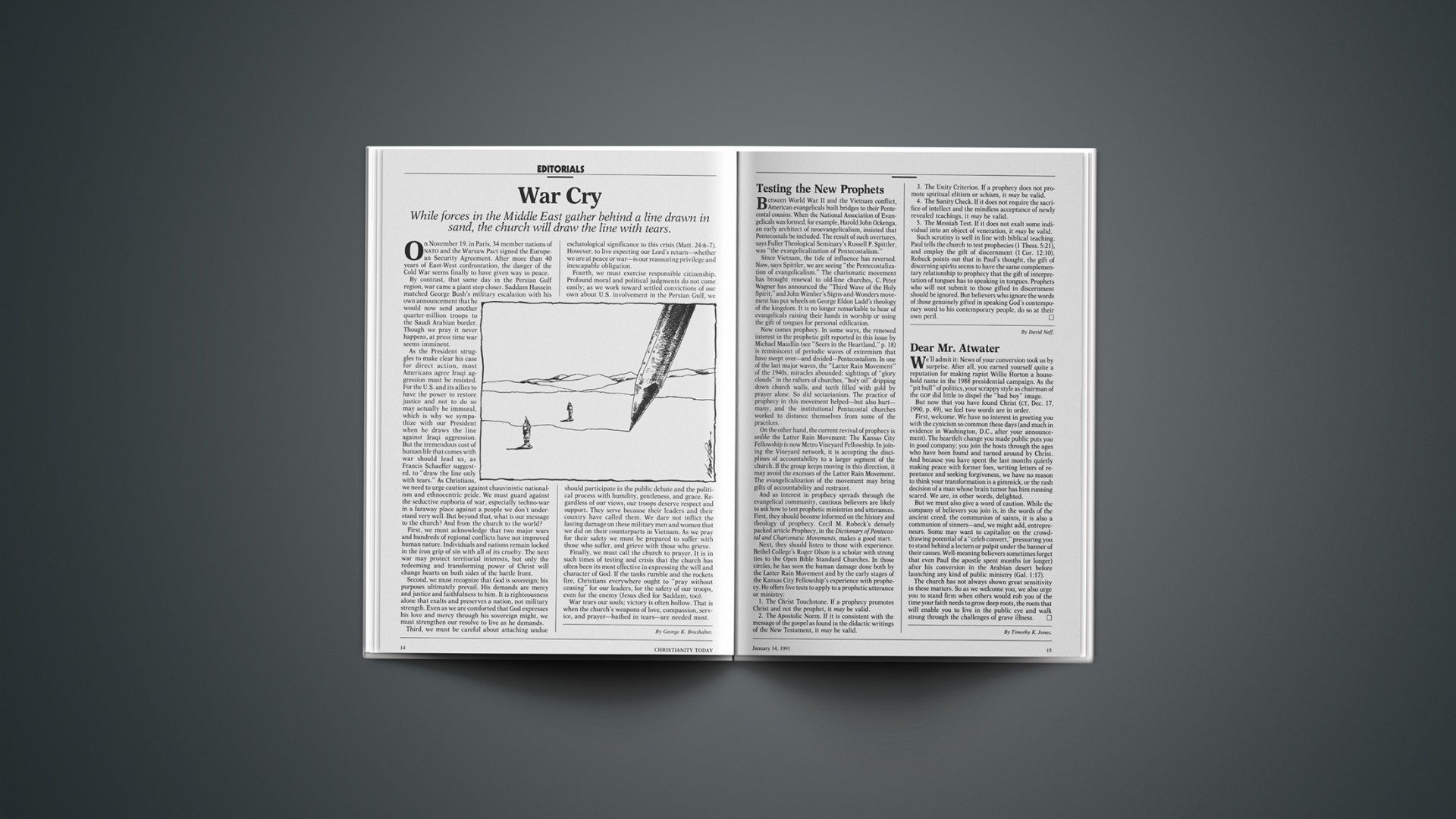Between World War II and the Vietnam conflict, American evangelicals built bridges to their Pentecostal cousins. When the National Association of Evangelicals was formed, for example, Harold John Ockenga, an early architect of neoevangelicalism, insisted that Pentecostals be included. The result of such overtures, says Fuller Theological Seminary’s Russell P. Spittler, was “the evangelicalization of Pentecostalism.”
Since Vietnam, the tide of influence has reversed. Now, says Spittler, we are seeing “the Pentecostalization of evangelicalism.” The charismatic movement has brought renewal to old-line churches, C. Peter Wagner has announced the “Third Wave of the Holy Spirit,” and John Wimber’s Signs-and-Wonders movement has put wheels on George Eldon Ladd’s theology of the kingdom. It is no longer remarkable to hear of evangelicals raising their hands in worship or using the gift of tongues for personal edification.
Now comes prophecy. In some ways, the renewed interest in the prophetic gift reported in this issue by Michael Maudlin (see “Seers in the Heartland,” p. 18) is reminiscent of periodic waves of extremism that have swept over—and divided—Pentecostalism. In one of the last major waves, the “Latter Rain Movement” of the 1940s, miracles abounded: sightings of “glory clouds” in the rafters of churches, “holy oil” dripping down church walls, and teeth filled with gold by prayer alone. So did sectarianism. The practice of prophecy in this movement helped—but also hurt—many, and the institutional Pentecostal churches worked to distance themselves from some of the practices.
On the other hand, the current revival of prophecy is unlike the Latter Rain Movement: The Kansas City Fellowship is now Metro Vineyard Fellowship. In joining the Vineyard network, it is accepting the disciplines of accountability to a larger segment of the church. If the group keeps moving in this direction, it may avoid the excesses of the Latter Rain Movement. The evangelicalization of the movement may bring gifts of accountability and restraint.
And as interest in prophecy spreads through the evangelical community, cautious believers are likely to ask how to test prophetic ministries and utterances. First, they should become informed on the history and theology of prophecy. Cecil M. Robeck’s densely packed article Prophecy, in the Dictionary of Pentecostal and Charismatic Movements, makes a good start.
Next, they should listen to those with experience. Bethel College’s Roger Olson is a scholar with strong ties to the Open Bible Standard Churches. In those circles, he has seen the human damage done both by the Latter Rain Movement and by the early stages of the Kansas City Fellowship’s experience with prophecy. He offers five tests to apply to a prophetic utterance or ministry:
1. The Christ Touchstone. If a prophecy promotes Christ and not the prophet, it may be valid.
2. The Apostolic Norm. If it is consistent with the message of the gospel as found in the didactic writings of the New Testament, it may be valid.
3. The Unity Criterion. If a prophecy does not promote spiritual elitism or schism, it may be valid.
4. The Sanity Check. If it does not require the sacrifice of intellect and the mindless acceptance of newly revealed teachings, it may be valid.
5. The Messiah Test. If it does not exalt some individual into an object of veneration, it may be valid.
Such scrutiny is well in line with biblical teaching. Paul tells the church to test prophecies (1 Thess. 5:21), and employ the gift of discernment (1 Cor. 12:10). Robeck points out that in Paul’s thought, the gift of discerning spirits seems to have the same complementary relationship to prophecy that the gift of interpretation of tongues has to speaking in tongues. Prophets who will not submit to those gifted in discernment should be ignored. But believers who ignore the words of those genuinely gifted in speaking God’s contemporary word to his contemporary people, do so at their own peril.
By David Neff.










